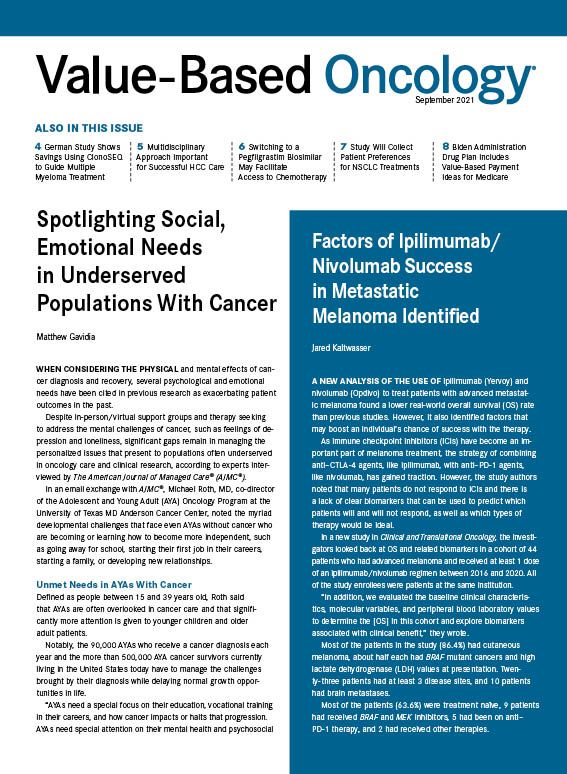- Center on Health Equity & Access
- Clinical
- Health Care Cost
- Health Care Delivery
- Insurance
- Policy
- Technology
- Value-Based Care
Study Will Collect Patient Preferences for NSCLC Treatments
This study protocol comes amid a paradigm shift in the treatment of advanced-stagen non–small cell lung cancer (NSCLC) following the emergence and uptake of immunotherapy.
A new study is aiming to collect information on patient preferences for treatments for non–small cell lung cancer (NSCLC). The study protocol comes amid a paradigm shift in the treatment of advanced-stage NSCLC, following the emergence and uptake of immunotherapy, which created options that consist of immunotherapy monotherapy, chemotherapy monotherapy, or a combination of those treatments.
“In the last few years, patient preference (PP) for treatment outcomes has been receiving increasing attention as a relevant source of complexity. Specifically, PP heterogeneity arises when patients differ in how they value specific treatment attributes or outcomes,” wrote the researchers.
Their update was published in a recent issue of Frontiers in Medicine.
The data will offer insights into how patients prioritize certain attributes that vary between treatments. For example, chemoimmunotherapy regimens are often administered intravenously over a 4- to 5-hour period while immunotherapy alone is administered over approximately 1 hour. Immunotherapy also tends to be more well tolerated than chemotherapy, the authors noted.
In their paper, they outline their plan for initiating an online survey among over 500 patients through 2 dissemination methods:
- Discrete choice experiment (DCE): a quantitative method that has study respondents state their preference of hypothetical alternative scenarios defined by different levels of several characteristics; responses are used to determine the value they place on each attribute
- Swing weighting (SW): a newer quantitative method used for determining patient preferences, which asks respondents to choose which attribute they would prioritize to improve, ranking them from the worst to best
“SW and DCE are 2 widely used PP methods in the field of health. Notwithstanding, research directly comparing DCE and SW is particularly lacking. Methods such as SW that do not force patients’ simultaneous trade-offs between multiple attributes are considered simpler,” explained the researchers. “Otherwise, others suggested that direct comparisons in a DCE can be easier for patients. Therefore, the aim of this study is to compare the performance and results of DCE and SW in a common preference context through empirical research.”
Attributes that patients included in the survey they say they will react to include how the treatment is administered, odds of 5-year survival, change of long-term skin problems, chance of extreme fatigue, and severity of hair loss.
Once the data are collected the researchers will analyze how similar the results are between the 2 methods and pinpoint the strengths and weaknesses of each when it comes to identifying and profiling treatment options.
The survey will also assess how demographics—like age, sex, and education level, as well as clinical factors like cancer stage and line of treatment—will sway or explain patient preferences.
Reference
Monzani D, Petrocchi S, Oliveri S, et al. Patient preferences for lung cancer treatments: a study protocol for a preference survey using discrete choice experiment and swing weighting. Front Med (Lausanne). Published online August 2, 2021. doi:10.3389/fmed.2021.689114

Addressing Financial Toxicity With Navigators and Better Conversations Around Decision Making
June 5th 2018Financial toxicity impacts a lot more than a patient's finances—it leads to nonadherence and poorer health outcomes. Financial navigators are increasingly being used to be proactive about addressing high healthcare costs and the resulting financial toxicity.
Listen
